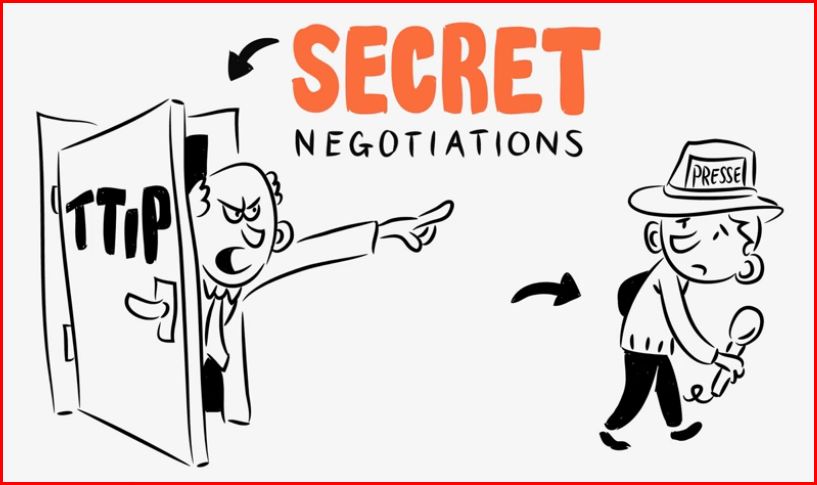The promised ‘transparency’ around TTIP has been a sham
The Guardian | 1 September 2015
The promised ‘transparency’ around TTIP has been a sham
Sven Giegold
Are you concerned about the implication of the Transatlantic Trade and Investment Partnership (TTIP)? Don’t worry! Only this month, the EU trade commissioner Cecilia Malmström promised another offensive on TTIP transparency: even more documents from the negotiations would be made available.
Her promise was put to the test only a few days later: the corporate transparency nerds of Corporate Europe Observatory finally received documents on exchanges between the tobacco lobby and the Brussels institution concerning TTIP and the EU-Japan trade talks. The punchline of the story? Most of the documents were redacted. An exercise in black humour, in the most literal sense possible. A picture of the blackened documents received thousands of shares and likes on social media since.
This rather amusing episode demonstrates the secrecy that still pervades the trade deals. Certainly, the EU commission has responded to the wave of criticism by civil society organisations against TTIP. A long list of documents, which they had previously kept secret, was published on its website. But the most important TTIP documents are still unavailable. No one knows what the US government is really asking from Europe. This is why many positive as well as negative claims cannot be substantiated, and exaggerations from supporters and adversaries of TTIP dominate the debate. Wikileaks’s offer of a €100,000 reward for the first person to leak the most secret documents is therefore highly welcome.
We shouldn’t make the mistake of focusing too much on TTIP alone, though: not even the EU’s negotiation mandates for most ongoing bilateral trade negotiationsare public.
Unfortunately, most politicians in the European parliament are as much in the dark as ordinary citizens. We MEPs may get access to a few more documents in the parliament’s reading room than those searching the EU commission’s website. Nevertheless, the most important ones containing the demands of the US government are kept secret, even from MEPs. Even worse, although there are thousands of pages of documents, readers are not allowed to take any notes. Non-native English-speaking MEPs are further deterred by highly technical trade-law jargon. And while we could employ staff who are better trained to read the documents, they are not allowed to access the reading rooms. Therefore, the right of access to documents for MEPs is largely a sham. A real understanding of what is going on is only achieved through the actual publication of documents.
Green MEPs have consistently demanded that full transparency of trade negotiation should be made a precondition for their progress. I simply do not understand that – in particular – conservative, liberal and socialist colleagues applaud the continuation of negotiations that they cannot effectively control.
In order to regain credibility and public trust, the European Commission should end secrecy in trade negotiations and publish all important documents and in particular all negotiation mandates.
As tempting as it may be to assume that this lack of transparency is solely an EU phenomenon, it is not. International deals have always been negotiated in darkness. This is why not even Europhobic governments such as the Conservatives in the UK have complained credibly about the lack of TTIP transparency. Otherwise it would become too evident that their own international negotiations are hidden behind the same veil of opacity. The European parliament continues to be the only important political space where representatives from different countries negotiate international law under the eyes of the public. This is a historic achievement in building international democracy, of which Europe can be truly proud.
What is TTIP and why should we be angry about it?
Read more
Beyond the lack of transparency, the real trouble with TTIP and the EU’s multitude of bilateral trade deals is not in the method, but in substance. Europe should put its weight behind a multilateral trading system based on open markets, fairness, sustainability and democracy. An equitable reform of the World Trade Organisation rules is clearly better for business and ethics than lots of bilateral trade and investment treaties. It is a myth that the WTO will never progress. The WTO trade talks could succeed if EU member states were ready to end unfair privileges, such as unsustainable agricultural subsidies and an obsession with intellectual property rights even in the poorest countries.
TTIP, CETA and other bilaterals are much more than traditional trade agreements. They are deals aimed at harmonising or mutually recognising regulations and standards for goods and services. This touches the very heart of our democracies in Europe. Certainly international harmonisation of technical standards can enhance efficiency and cut red tape. A TTIP limited to technical standards and their application only could be positive.
But when it comes to values-based choices, democracies must be free to change the level of regulation. Unfortunately, TTIP and co are about the most valuable standards in our societies, such healthy food, stable financial markets or chemical safety. European democracy should be able to increase environmental, social and consumer rights without having to find agreement with trading partners or to put its own businesses into a competitive disadvantage.
Europe must remain free to develop the common market into a space of high standards for consumers, workers and the environment. Blocking this is likely to be the real motive behind the big business lobby’s obsession with TTIP and co. Europe is big enough to sustain a high level of social, consumer, health and consumer rights even in a globalising world. No transnational company wants to stop selling to the European common market. Therefore, Europeans hold in their hand a powerful tool for greening global business. This democratic tool we must not give up for the small potential benefits of bilateral trade deals negotiated behind a veil of secrecy.






